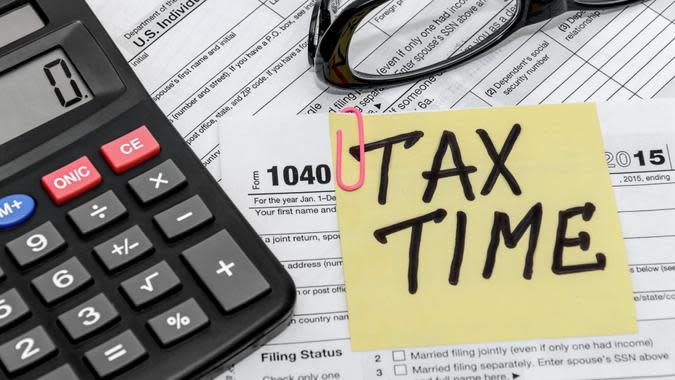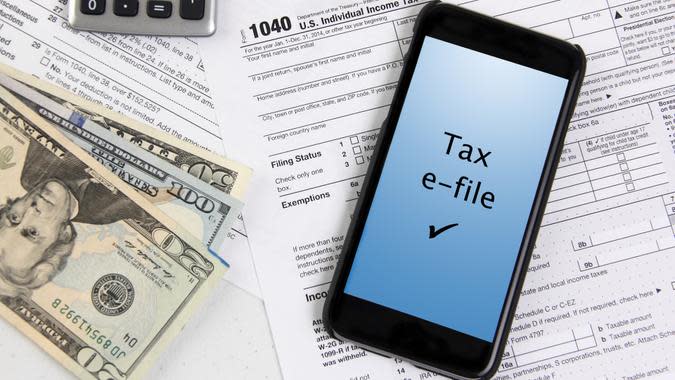7 IRS Tax Secrets To Know for Your Next Filing

Filing taxes is something that few people get excited about outside of accountants and auditors. After all, no one really enjoys forking over their hard-earned money to the government, and the specter of an IRS audit is enough to strike fear into most American taxpayers. But the truth is that taxes are a necessity for a functioning American society, so it's best just to learn the ins and outs of the system so that you don't make any big mistakes. However, the U.S. Tax Code is literally thousands of pages long, and the IRS doesn't go out of its way to reveal exactly how the system works, so you'll have to do some legwork to learn some of its secrets.
Zelle Facebook Marketplace Scam: How To Recognize and Avoid This Scam
Find Out: Stimulus Payments Are Coming to These States in October

Most 'Audits' Are Simply Letters in the Mail...
The word "audit" rightfully strikes fear into the hearts of most taxpayers. The idea of sitting across the table from a professional tax agent who will probe into every single transaction you've made over the past 10 years is daunting even for those who have nothing to hide. But the reality is that these types of audits, known as office or field audits, are quite rare. In fact, according to H&R Block, 77% of all audits are simply mail audits, in which the IRS asks you to respond with documents or answers supporting the information you submitted on your return.
Sometimes, an "audit" isn't even an audit. The IRS sends about 4 million so-called CP2000 notices each year, which are simply notifications that the IRS has recalculated a portion of your return. In most cases, the IRS simply asks you to send in additional money that is due, usually due to mismatches between the income you reported and the income you actually received. Occasionally, the IRS will even send you a check if it calculates that you overpaid your taxes.
Take Our Poll: Do You Have an Emergency Fund Established?

...But Even Mail Audits Are Infrequent
In 2021, out of 160 million individual income tax returns filed, the IRS audited just 659,003. That amounts to a minuscule 0.04% of all returns filed. And of those 659,003 audits, about 559,000 were correspondence audits conducted through the mail. This also means that only about 100,000 individual income tax returns were audited in person in 2021, or about 0.00625%. These are such negligible amounts that it means that your chances of being audited in any given year are close to zero, particularly if you file honestly and don't have any glaring red flags on your return (such as declaring a large income and paying no taxes).

You Have To File Your Taxes On Time, Even If You Disagree With the Results
One thing that the IRS is an absolute stickler about is ensuring Americans pay their fair share of taxes on time. If you are even one day late with an IRS payment, you should expect penalties and perhaps even fines on the original amount owed. This is true even if you disagree with the calculations on your return. For example, if you complete your tax return but can't figure out why some deductions were disallowed, you still have to send in the amount your return says you owe. At a later date, you can discuss with the IRS why you should be allowed to take your deductions, and the IRS may even send you a refund. But if you don't file your return at all on the date it is due, you'll face a 5% penalty for every month that your return is late, up to a maximum penalty of a stiff 25%. The bottom line is that you must file your tax return on time, even if the result isn't what you think is correct.

You'll Have To Find Out About Most Deductions and Credits on Your Own
The IRS is kind enough to print your standard deduction amount right on your tax form, so that's a deduction that most Americans don't overlook. However, if you're going to be itemizing your deductions, you'll have to dig deep into IRS paperwork and instructions to determine what is a legal deduction. In some cases, you may be eligible for deductions or credits you know nothing about, such as the retirement saver's credit, mortgage insurance premiums, the child and dependent care credit or even the earned income tax credit. Although there is plenty of information published about these credits and deductions, you'll have to do your own homework to see if they apply to you and how much you can benefit. If you have any doubt that you're maximizing your credits and deductions, be sure to consult with an accountant.

You Can Pay Your Taxes in Installments If You Can't Pay the Full Amount Right Away
The IRS generally allows taxpayers who owe $50,000 or less in taxes and penalties to establish a long-term installment plan. You'll still owe penalties and interest on your balance, but you can avoid having the IRS hunt you down and demand immediate payment. Short-term payment plans of 180 days or less may be available to those owing as much as $100,000 in taxes and penalties. One caveat is that while interest rates on installment plans used to be quite low, they have risen along with all other rates in 2022 and are now at 6% as of October 2022. But this is still a much better option than putting your tax debt onto your credit cards.

You May Be Able To Negotiate With the IRS
No, you can't send the IRS a letter if you think your taxes are too high and pay less than you owe. This will result in the swift assessment of additional penalties and potentially even a criminal charge, in the most egregious cases. But at the end of the day, the IRS simply wants to get paid. If you have outstanding back taxes that stretch back for years, you may -- with the emphasis on may -- be able to negotiate a smaller balance due if you can pay in full immediately. You should not rely on this to get out of back taxes that you owe, and it's entirely possible that your negotiation will prove fruitless. However, with the help of an expert attorney and other mitigating factors, the IRS may potentially settle your claim for a smaller amount, particularly if you can pay the negotiated amount now and don't seem to have any other means to pay the original balance owed.

You Can Probably File Your Taxes for Free
In 2021, 90% of individual tax returns were filed electronically, with many taxpayers using expensive software packages. What many Americans are unaware of is that the IRS partners with tax preparation and filing companies to offer its own online tax filing service that is absolutely free of charge. Known as IRS Free File, the program allows those with an adjusted gross income of $73,000 or less to file their federal tax returns for free just by answering a few simple questions and using a guided preparation system online. Tax preparation and filing are free for some states as well. In 2020, the year for which the most recent data is available, the IRS reported that 71% of Americans were eligible for the free filing service, but only 4% actually participated. If you're looking to save yourself some money this tax filing season, check with IRS Free File to see if you are eligible -- because you probably are.
More From GOBankingRates
This article originally appeared on GOBankingRates.com: 7 IRS Tax Secrets To Know for Your Next Filing
